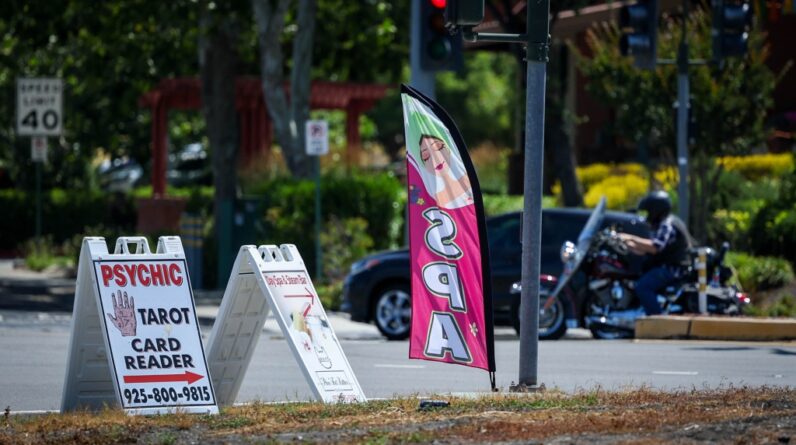
Call it a sign of the times.
Starting Saturday, temporary signs directing people to open houses or garage sales will be illegal in much of Livermore, along with political signs. The city has banned signs on public property, such as sidewalks and medians, starting July 1.
The City Council approved the ban last year in an attempt to curb the excess of political signs that appear every election season. But intentionally or not, the new law prohibits any temporary signs on public roads.
The ban, which is considered “content neutral” to reduce exposure to litigation alleging First Amendment violations, lists all kinds of signs on its website, including those that direct people to businesses, events, sales of gardens and open doors. The move frustrates local real estate professionals who say it throws the baby out with the bathwater by restricting signs that haven’t been causing trouble to target troublesome politicians.
David Stark, a spokesman for the Bay East Association of Realtors, an advocacy group with more than 6,000 members, including in Livermore, called on the city to suspend the ban and “go back to the drawing board.”
“This ban was not precipitated by garage sale signs, car wash signs or even open house signs,” Stark said. “This ban was inspired by election signs. You don’t need to ban all these other signs while you’re working on an ordinance that will be feasible for the community.
Realtors are also concerned that without open house signs, homes will be harder to discover for potential buyers who fall in love with a new neighborhood or want to make Livermore their home, Stark said.
“Believe it or not, even with all the high-tech mapping and navigation systems that are available to home buyers, there are a significant number of home buyers who use real estate open house signs to discover houses for sale,” he said. “Especially in today’s market where there is such low inventory and so few options.”
The prohibition does not apply to temporary signs (campaign or otherwise) placed on private property, such as residential lawns. It also doesn’t affect the downtown area, where officials say businesses can still place their A-frame signs on nearby sidewalks.
City officials say workers will remove signs that violate the temporary sign ordinance. The city will also conduct an educational campaign about the new ban before it begins issuing warnings for a first offense and citations for additional violations.
The outright ban on temporary signs was proposed by former Mayor Bob Woerner at a City Council meeting in November, when he said the problem of vandalism and visual destruction caused by the proliferation of political campaign signs had been reported by community members in recent electoral cycles.
The decision to ban all temporary signs, he said at the time, was aimed at putting in place a solution that had been eluding the city and could be reviewed and adjusted by the new iteration of City Council before that the application began on July 1.
“Trying to be perfect, you never get there,” Woerner said. “But setting something up and then tweaking it is the thought process here.”
The ban passed on a narrow 3-2 vote.
On June 12, just weeks before the current July 1 implementation date, the City Council heard a proposal that staff said had been researched and developed with input from the real estate community. That proposal would have allowed temporary signs to be placed at city intersections from Thursday to Monday. It also included a $20 fee for any non-compliant signs to be removed by city workers.
The staff proposal died without a motion or city council vote, which meant all temporary signs would be banned from public streets.
Vice Mayor Brittni Kiick called Livermore a leader in climate action at the meeting and said the city should not promote temporary plastic signs on public property.
“It’s not about whether we like the campaign signs or not. Or whether we like real estate signs or not,” Kiick said. “It’s about putting a piece of plastic and metal all over our city, whatever it says.”
Tracey Esling, founder and partner of WorldView Real Estate in Livermore, lamented the ban in an interview. Esling said at a recent open house, a potential buyer called her and said their GPS navigation gave up and they needed directions. Esling went out and directed the potential buyer with the help of a real estate sign.
Esling, who also serves as treasurer of the East Bay Association of Realtors, said her goal is to continue working with city staff to get to a place where everyone is happy.
What will Esling do with their temporary signs from Saturday?
“They’ll stay in the garage,” he said.
[ad_2]
Source link





